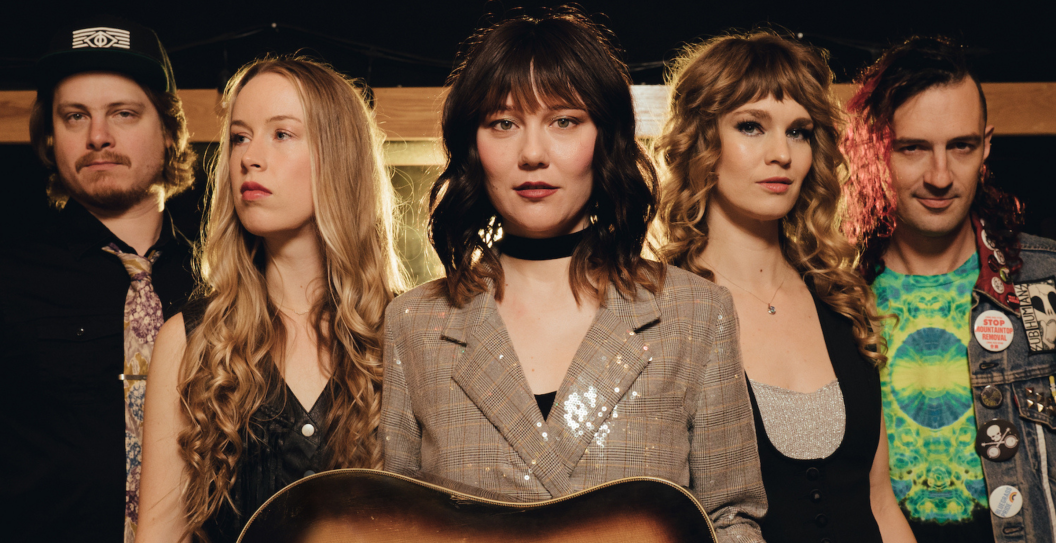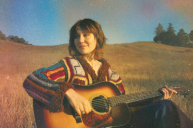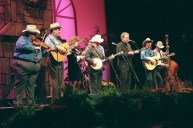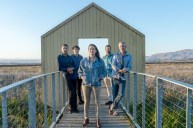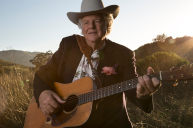Molly Tuttle chases many things in her life. A song, inspiration, industry recognition. But it all comes back to "chasing being the most authentic version of myself," Molly Tuttle said in a recent phone conversation. "I'm always trying to incorporate who I am into my albums and into my stage shows. We're all just trying to find what makes us happy and what makes us feel fulfilled in our lives. For me, that's sharing my story through music."
Videos by Wide Open Country
With the newly-released City of Gold (produced by Jerry Douglas), Tuttle brought her live band the Golden Highway into the studio for the very first time. There's a vitality to the record that oozes between songs, lightening them up like a fireworks display. As the follow-up to 2022's Crooked Tree, Tuttle keeps on the same stylistic path while expanding her songwriting and funneling in tales about legalized marijuana, fortune-seeking out West, gentrification and abortion. The singer-songwriter, as is her way, claws her way through the stories with a delicately precise lead vocal and playing that rivals the likes of Billy Strings and Trampled by Turtles.
Tuttle is her own special kind of musician, though. From the rambling "Where Do the Wild Things Go?" to the whirling dervish "Down Home Dispensary," the record shines with well-thumbed musicianship and lyrics that penetrate the heart. In continuing to fine-tune her craft, she found Hazel Dickens, a bluegrass musician known for her feminist songs, informing much of her own work this go-'round.
"She's just someone who I look up to as someone who wrote songs about her life experience - but also wrote songs about what she believes in. She wrote a lot of bluegrass songs that were from the women's perspective," she said, "and told struggles that women face in society and songs about worker's rights. She was very outspoken as a songwriter and just as a person. There are these pictures of her at picket lines at West Virginia coal mines. And I find that really inspiring. In this genre that's more known as kind of a patriarchal style of music, she's an early outspoken voice."
Wide Open Country spoke with Tuttle about songwriting shifts, death, her abortion song, Alice in Wonderland and more.
This interview has been edited for length and clarity.
In taking your band into the studio for the first time, were there songs that were harder than others to get right?
There were songs that came fairly easily, and then it's always the ones you think are gonna come the easiest that are hard. I think one's like "Stranger Things" we were worried about because there were so many chord changes. It's a type of song we haven't played together, but that one came easier than one like "San Joaquin." That's more of a straight-ahead bluegrass song, but we're playing it so blazing fast. It's just the thing you have to think about. Are we speeding up too much? Are we slowing down? Are we all playing together? There were a couple that we thought would be a breeze and then we get in there and we're like, "whoa, this is harder than we thought."
How did you see your songwriting change?
I let more outside influences in on Crooked Tree. I had this vision that I was gonna write a bluegrass album that my grandparents would love. My grandfather was a banjo player, and he listened to Flatt and Scruggs and the Stanley Brothers. That's where the love of bluegrass started in my family. So I was thinking about how this music began and wanted to write songs that people could play at a bluegrass jam session or at a festival. Then, with this record, I felt I wanted to take it a step further and maybe expand my songwriting to include other influences outside of just bluegrass music and American roots music - to just spend time on the arrangements, on the chords, and make these songs a little more outside of the box and incorporate these different styles of music that I love and that I listen to.
With your song "When My Race is Run," you talk about mortality. So, what's your relationship with death?
I don't really have any strong religious or spiritual beliefs. It's always something that's kind of mysterious to me. I don't really know what happens when you die. I think probably just nothing happens, and you're gone, and that can be kind of scary. There is this comforting feeling of maybe I'll see someone I love again - and who would you wanna see when you pass over, who would you want to spend the rest of time with if there is an afterlife? But that's not necessarily something I believe in, but it was kind of a song that I felt like I wanted to write as just kind of one of those timeless messages that no matter what you believe in, maybe you can relate to this feeling.
Are you afraid to die?
It's something I don't think about all the time, but it is something that makes me want to make the most of my life here. If this is all the time you get, then I wanna really make it count and do all the things that I want to do and soak in every experience that I can.
Did this song come together pretty easily then?
It wasn't hard to write, but I did spend time making the lyrics just how I wanted. I wrote that song after playing "I Shall Be Released" in a writers' room with our friends and Ellie Holcomb. We felt so inspired by that song and just its powerful message. Then I was thinking, "I want something like that on my album that is more of a universal message for everyone and that tackles a big subject."
Another big subject you tackle on the album comes with "Goodbye Mary," a song about abortion. Was this in direct response to the overturning of Roe V. Wade?
Yes, we wrote that one only weeks after Roe V Wade was overturned. I was really struggling with it, feeling a lot of grief around that and just feeling sad that the next generations are gonna have fewer rights than I had growing up and that my mom had. I was thinking back to my grandmother's generation. She was born in 1917. My grandmother's name was Mary, and coming up in her time, her people really struggled with that. My mom told me stories about women that my grandmother was friends with trying to push themselves down the stairs or do things to feel and break away from men who were abusing them or just feeling trapped by the reality of not having control over their bodies.
With "Alice in the Bluegrass," you not only reference Alice in Wonderland but stories like Wizard of Oz and Humpty Dumpty.
We were kind of just mixing in a lot of different folk tales along with some lines that are pulled straight from old folk ballads or old-time tunes. It was mostly inspired by: what if Alice in Wonderland was set in the backwoods of Kentucky? I remember Alice in Wonderland was one of my favorite books as a kid, so things like the Smoking Caterpillar became a caterpillar on a tractor. It was really fun.
The musical transition into "Stranger Things" is a really nice moment.
Those two songs I felt went together in my mind. 'Stranger Things' is one that I had laying around in a folder of songs for a couple of years, and I didn't know where it fit on my record Crooked Tree. I didn't even really think about recording it for that one because it felt too weird, too dark. But on this album, since I was exploring some heavier themes and trying out a bunch of different musical directions - within this parameter of having all these bluegrass instruments playing these songs - that felt like it could fit really well with it in the bluegrass. It's the flip side to that song now we've gone down the rabbit hole.
With the closing track, "The First Time I Fell In Love," you make it a love song about self-love and self-care. It's not your typical love song.
It came together kind of stream-of-consciousness style. I was talking about details of my life growing up - shows I played and the first memories I have, and a lot of fond memories of my childhood. I was also talking about how I wanted to write a song that was all about coming to that place of self-acceptance, whether that's just a brief moment when you're standing on stage and feeling good about the song you're singing or if it's the moment all alone or a time that you are having fun with your friends. All those little glimmers of happy times growing up cause that was something I struggled with was just accepting myself as a kid. I think a lot of people can resonate with that. Those early adolescent years are hard for everyone.
What things do you do to show love to yourself?
I think music and just writing and performing are things that I've always loved to do. And just following that passion for me has been something that's taught me a lot about self-acceptance. The more I write and can incorporate different stories from my life and different things that I believe in, the better I feel. I love expressing myself in that way. On a day-to-day basis, I try to take care of my body - going on walks and eating as well as I can on the road. [laughs] Those are the basics that keep me feeling.
